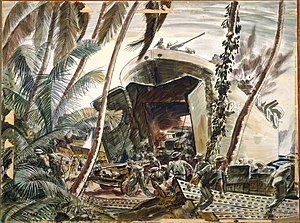Battle of the Treasury Islands
| Battle of the Treasury Islands | |||||||
|---|---|---|---|---|---|---|---|
| Part of the Pacific Theatre of the Second World War | |||||||
 Russell Clark's painting Landing ships under fire, Treasury Island (3rd NZ Division), 27 October 1943 |
|||||||
|
|||||||
| Belligerents | |||||||
|
|
|
||||||
| Commanders and leaders | |||||||
| Robert A. Row George Fort |
|||||||
| Strength | |||||||
| 6,574 men 6 destroyers 32 aircraft |
231+ men 49 planes |
||||||
| Casualties and losses | |||||||
| 226 casualties | 223 dead 8 POW |
||||||
The Battle of the Treasury Islands was a Second World War battle that took place between 27 October and 12 November 1943 on the Treasury Islands group, part of the Solomon Islands. The battle formed part of the wider Pacific War and involved New Zealand and US forces fighting against Japanese troops. The majority of the ground forces were provided by the New Zealand 3rd Division.
The Allied invasion of the Japanese held island group intended to secure Mono and Stirling Islands so that a radar station could be constructed on the former and the latter be used as a staging area for an assault on Bougainville. The attack on the Treasury Islands would serve the long term Allied strategy of isolating Bougainville and Rabaul and the elimination of the Japanese garrison in the area.
As part of the Allied strategy of isolating Bougainville and Rabaul and eliminating the large Japanese garrison in the area, in late 1943, as the Solomon Islands campaign progressed, the Allies decided to launch an attack on the Treasury Islands. The invasion, to be conducted primarily by the New Zealand Army, supported by American forces, was codenamed Operation Goodtime. For the operation, the New Zealand 8th Infantry Brigade Group, commanded by Brigadier Robert Row and part of the New Zealand 3rd Division, was assigned to the United States' III Amphibious Force, which assigned its Southern Force under Rear Admiral George H. Fort for the operation.
The Allies launched the invasion of the Treasury Islands at 06:06 hours on 27 October. A total 3,795 men landed in the assault wave with the remainder of the Allied force landing in four waves during the following 20 days, to reach a total of 6,574 men. The operation was the first amphibious assault launched by New Zealand troops since the Battle of Gallipoli in 1915. It was the second combat operation undertaken by the New Zealanders in the Pacific, following the Land Battle of Vella Lavella, which had taken place the previous month.
...
Wikipedia
